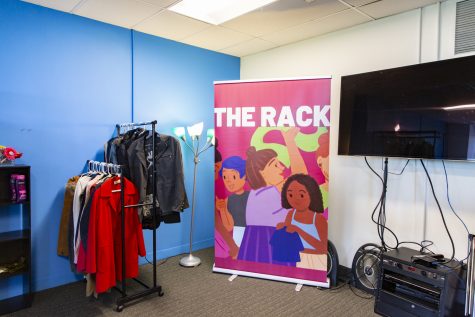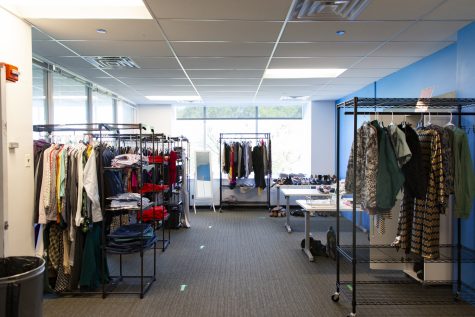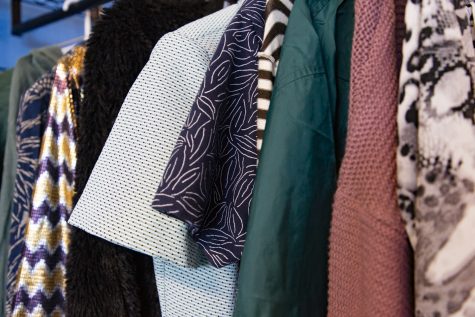On-campus initiative helps students acquire clothing, health supplies
May 14, 2021

Caden Marshall said he feels good in women’s clothing, but does not always feel comfortable shopping for it in public.
The sophomore ASL-English interpretation and musical theatre double major found out about Columbia’s version of a free thrift store, the Columbia Rack, located on the fourth floor of the 618 S. Michigan Ave. building, two years ago while looking for on-campus events with free food. In an attempt to get free waffles at a Student Diversity and Inclusion event, he found a three-piece suit that fit him perfectly.
At the Rack, everything is mixed, Marshall said, and this breaks boundaries and allows people to experiment.
Matthew Rillie, coordinator of Student Support and Engagement for SDI, said the Columbia Rack is a safe place to find clothing that feels good for students. If a student needs clothing, they can visit the Rack; if they need food, the college has a food pantry; and if a student is in need of emergency funding, they can apply for money from the college.
The Columbia Rack began as clothing swaps hosted in 2017 by Columbia Pride, Columbia’s LGBTQ+ student group.
In 2018, SDI decided to make it a permanent resource, where students can go any day year-round to get free clothing or other hygiene products needed.
“Having clothing feels affirming; it feels good; it feels so you … and there are a lot of barriers to getting there,” Rillie said. “Especially if you are a queer trans student and you are wanting to explore what clothing feels good to you.”
Cost, safety and feeling uncomfortable are some of the barriers trans students may face when shopping for new styles, Rillie said.

When the pandemic began, Marshall noticed many of his friends questioned their gender identity, and he has been going to the Rack regularly and brings friends who are looking for clothes that fit their gender identity better.
Kari Sommers, associate dean of Student Life, said as a culture, people think of college as a magical and perfect time, but that is not always the case.
“Students face real-life challenges when they’re in college, and we want to make sure that we have a comprehensive strategy and approach for serving students in need until they can get back on their feet and work through it,” Sommers said.
Amanda Burris, a sophomore graphic design major, said when she started college in Fall 2019, their family was going through financial hardship.
“My dad was unemployed. I was working full-time during that semester, and I was like, ‘It’d be really nice to get a couple hundred bucks just to have some food money,'” Burris said.
At the time, Burris knew Columbia Cares existed, but she did not know how to apply for it. When the pandemic hit and Columbia started advertising it more, she was able to get enough money to pay off their credit card and apartment bills, and she was able to visit their family in Missouri.

Students can apply for emergency funds and care packages through the Columbia Cares website or by emailing the Dean of Students Office, deanofstudents@colum.edu, with a short description of their current situation. Faculty, staff and students can also apply on behalf of other students.
Anyone can donate to Columbia Cares through the college’s giving page or by dropping clothes and other essential items or food at the SDI and Student Relations offices.
The Student Government Association created a list of food essentials for people to buy if they want to donate food for care packages.
“If you’re going to go shopping, we have the preferred inventory list available on the website,” Sommers said. “That’s the list the student government developed for us to make sure that they’re student-friendly foods.”
Rillie said they want to challenge the idea of students not asking for help until they reach rock bottom.
“We celebrate when every single student comes in to claim a resource that is for them,” Rillie said. “The Rack is not a charity.”







